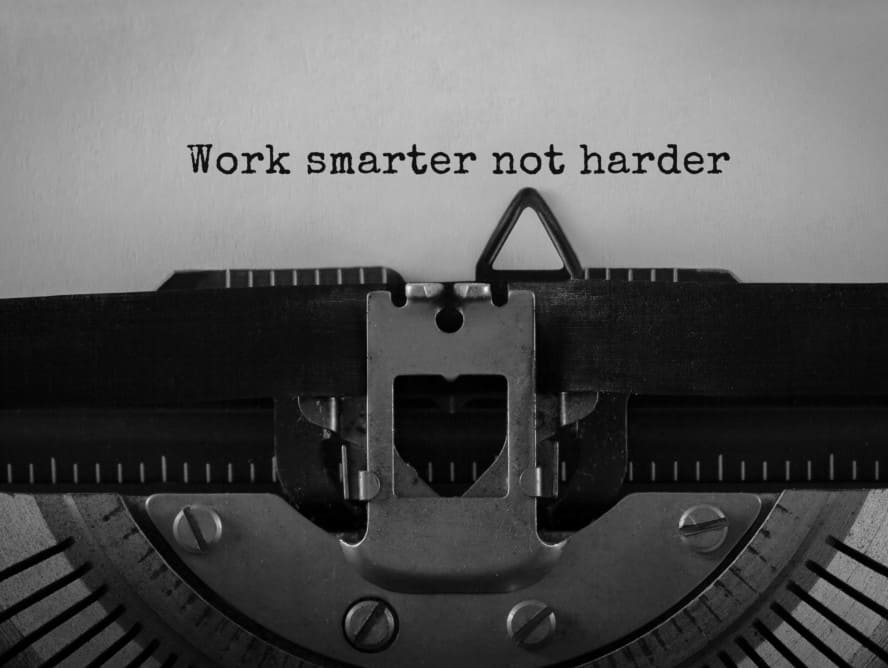
10 Simple Strategies to Work Smarter, Not Harder
Psst. Come close and we’ll let you in on a secret. There are 10 simple strategies that can help you work smarter, not harder. If you do these 10 simple things, we guarantee you will be more efficient and productive!
Ok, these strategies aren’t exactly secret. In fact, none of the them are new ideas. They’ve been in the performance, productivity, and success literature for decades. They are practical and tested and we have applied them in our work to help 700+ nonprofits, agencies, and foundations and their people make the world a better place. Drum roll please…
1. Be your authentic self
You are the only you out there – and no one can do you better. To be your authentic self, you need to know what holds you together, what gives you purpose, drive, and perhaps, what pushes your buttons. Know what you are good at, what makes you happy, and what doesn’t – acknowledge and embrace it!
2. Love what you do (or at least focus on the parts you do)
Focus mostly on the stuff you love doing, stuff that comes naturally to you. There will always be things that you don’t love, but still are required to do. So, be strategic. Tackle the stuff you enjoy less first thing in the morning. Dislike dealing with budget issues? Resolve them first thing so that you can focus on the stuff you really love the rest of the day.
3. Identify Goals
Be clear about your goals in the short term (monthly) and long term (yearly or more). If your organization doesn’t have clarity around goals (or there are too many), set your own goals within the context of your work. If you don’t know what you are trying to achieve, all work feels equally important. Like in Alice in Wonderland, “if you don’t know where you’re going, any path will get you there.”
4. Honor Imperatives
Imperatives are well…imperative. These are the few things that you must do (daily, weekly, monthly) to be successful, productive, and satisfied. Keep your written imperatives in a visible place. Build your daily, weekly, monthly plans and schedules around them.
5. Say No to Say Yes
If you are clear about strategies 1-4, then it’s much easier to say no to things that are not imperative. Figure out what you can say no to. For example, can you be more deliberate about the meetings you attend? Some are mandatory, but many are optional. Say no to meetings unless you are clear about the outcomes you need or what you uniquely contribute to it. Perhaps in some situations, a quick phone call would be a better use of time.
6. Focus on your circle of influence
As Stephen Covey discusses in The Seven Habits of Highly Effective People, successful people only focus on solving problems within their circle of influence. Do not spend your time or energy on problems for which you have no influence. Focus on those that you can influence.
7. Standardize routines
Take the time to create simple systems for routine tasks. Things that get handled routinely should be standardized as much as possible (we call it the “cut and paste” rule). Create job aids, easy guides, tricks, or pictures to help you with routine tasks.
8. Sometimes aim for less than A+
Not all tasks are created equal. There’s always some work that is okay to do at less than the A+ level. For example, an internal email may not need the same level of editing and review as an email to your entire membership list.
9. Motivate and delegate
A foundational management principle is to ensure tasks are handled at the appropriate level. Consider work are you doing that should be handled by someone else. Delegation is not only a time-saving strategy, it is an important motivation strategy (if done right), and important to building institutional knowledge. Just because you are a manager or executive, doesn’t mean you should to do everything yourself.
10. If all else fails, eat the elephant one bite at a time
If you haven’t yet perfected strategies 1-9, then chunk them out and handle only one piece at a time. If you get overwhelmed, breathe, make a list and prioritize the next hour, and get to work. The things at the bottom of the list do not have to get done.
Working smarter is not about working longer and harder. It is about understanding your personal constitution and organizing your work in a way that matters. It is about taking care of yourself. If you are not at your physical, emotional, or psychological best, being productive and satisfied at work just won’t happen.
For more time-saving tools, visit our training page and check out our High Impact Manager and Reshape the Future: Be a Nonprofit CEO training. Or email Lisa for more information.

